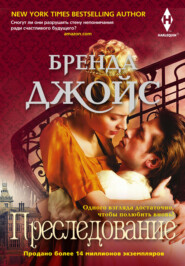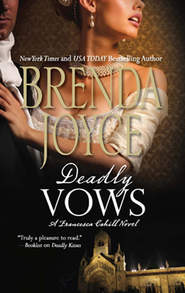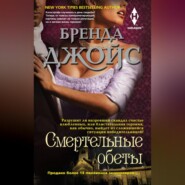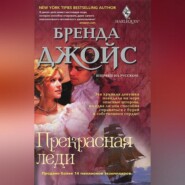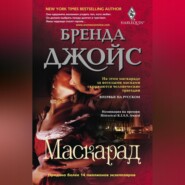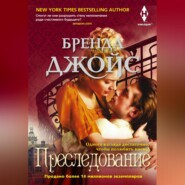По всем вопросам обращайтесь на: info@litportal.ru
(©) 2003-2025.
✖
Deadly Illusions
Автор
Год написания книги
2019
Настройки чтения
Размер шрифта
Высота строк
Поля
That made no sense. Francesca took off her gloves, laying them on the cheerful tablecloth. Bridget put a carrot, a potato and an onion into the pot. A pinch of salt followed. “Tell me why you think you were being followed,” Francesca said softly.
Tears filled Gwen’s eyes. “I don’t know! I didn’t see any one when I left police headquarters. But I had this feeling, a real strong feeling, that I was being watched! Haven’t you ever had that feeling?” she cried.
Francesca touched her arm. “Of course.”
“Oh Lord, where are my manners tonight? Miss Cahill, you have been nothing but kind to my daughter, saving her from those terrible men last month! Please, sit down. Bridget! Put on water to boil. We have tea,” she said brightly, the tears shining on her cheeks. “English tea. It’s special—I brought it with me,” she added, clearly referring to her recent move from Ireland to New York.
“Thank you,” Francesca said, taking a seat. Gwen contin ued to stand. “So you did not see anyone?”
“No. I didn’t. But I couldn’t shake the feeling, not the whole way from the police station.”
Francesca nodded. “Why don’t you sit, too? You have had an exceedingly difficult day.”
But Gwen had gone to the stove to stir the soup pot. “You probably think me mad,” she said over her shoulder.
“No, I do not.”
“Bridget, wash your face and hands.”
Bridget had been standing quietly in the corner of the room where the counter next to the stove met the sink. “I want to go home!” she suddenly cried. “I hate it here! But mostly, I hate Lord Randolph!”
Francesca stood, the urge to take the child in her arms overwhelming. She wondered who Lord Randolph was. Instead, Gwen rushed to her daughter, enfolding her against her bosom, holding her tightly. “I know, darling, I know. But we can’t go home. You know we can never go back.”
Bridget burst into tears and ran behind the curtain that clearly partitioned off a sleeping area. Gwen stood staring at the mustard-colored drape, clearly torn and anguished. Francesca could not fathom Gwen’s last words. Why couldn’t she and her daughter return home?
Francesca went to her and laid her palm on her shoulder. “How hard this must be for you and your daughter, making a home for yourselves in a new land.”
“It’s hard,” Gwen whispered. “I tried to find good work, but all I could find was work in a factory. We make candles all day long. At home, I was a ladies’ maid in a mansion on a hill. We were never hungry,” she added.
Francesca had recently hired a new maid for her own home, when the staff was already full. Ellie had been a vagrant but had witnessed a murder. Now she was the most dedicated maid at the Cahill home. She knew her mother, Julia, would not allow another addition to the household.
Francesca wondered if her sister needed another servant. How perfect that would be! “Do you have references?” she asked.
Gwen looked away. “I’m afraid not.”
Francesca was startled. She wondered what the lack meant, but knew that now was not the time to pursue it. And she did not doubt that Gwen had been a fine ladies’ maid. She was a fair judge of character, and trusted Gwen’s sincerity. Then a brilliant idea occurred to her. Calder Hart. She brightened. He wouldn’t care if she hired another maid for that huge mausoleum he called a home. She made a mental note to place Gwen in his domestic employ immediately. “May I ask you some questions, Mrs. O’Neil? I am taking on the case of Margaret’s murder.”
Gwen nodded, moving to sit down. She let out a sigh of exhaustion as she did so.
Francesca sat beside her. “Did you know Margaret Cooper?”
Gwen nodded. “She was already living here when we moved in. She was very pleasant, very friendly, offering to show me and Bridget around. She helped me get my first employment, but the work was so far downtown that I quit when I found the opening at the candle makers. We had supper together once or twice. She was a good person, Miss Cahill. She did not deserve to die!”
“So she was not married?”
“No, she was entirely alone in this world,” Gwen said.
“Did she have a gentleman friend?” Francesca asked, thinking about the fact that there had been no sign of a male visitor in her flat.
“No. In fact, I found it odd, as she was so pretty and kind.”
Francesca took a notepad and pencil from her purse and made some notes. “Margaret must have had some kind of personal life.”
“She went to work six days a week and to church every Sunday. You do know,” Gwen added, “that I have already told all of this to the police.”
“I would love to hear your answers for myself, if you do not mind. I care very much about this case and about bringing Margaret’s killer to justice,” Francesca said earnestly. “The police have a great many investigations to handle. I have just one.”
“Of course.” Gwen smiled a little for the first time that evening, apparently beginning to relax. The water began to boil and she got up to make the tea.
“What faith was Margaret?”
“She was Baptist,” Gwen said over her shoulder. Then she smiled again, her eyes softening. “I took her to my church once. She was very religious, Miss Cahill. Her mother was Irish. Did you know that?”
Francesca sat up straighter. Here was another link, she thought eagerly. Kate Sullivan and Francis O’Leary were Irish—and now, Margaret had turned out to be of Irish descent. “No, I hadn’t known. Where did Margaret work?”
“She was a shopgirl. She worked in some fancy sweet shop uptown. I don’t recall the store’s name but she referred to the fact that it was next door to A.T. Stewart’s.”
A.T. Stewart’s was a popular department store. The sweet-shop shouldn’t be that hard to locate. Gwen brought her a cup of tea carefully, as there was no saucer to catch any spills. Francesca smiled her thanks and inhaled. “It does smell delicious,” she said, meaning it. The tea was strong and spicy, exotic, and obviously expensive. It seemed like quite an indulgence for Gwen O’Neil.
“It is wonderful,” Gwen said almost proudly. “I put a spoon of sugar in it. I hope you do not mind.”
“Thank you so much,” Francesca said, knowing that sugar was another expense Gwen could not afford. She took a sip and found the tea as rich to the palate as it was aromatic. She set the cup down. “How did you find the body and when did you find it?”
Gwen’s smile vanished. “This morning. I was leaving to go to work. I was late because Bridget has a cough and I made her an elixir before I left. I let her stay home from school yester day and today.” She began to cry. “As I went down the hall, I saw that Margaret’s door was open. That was odd, so I glanced inside…and saw her lying there on her bed, as dead as could be.” She began to shake.
Francesca stood and hurried to her. “There, there, it’s all right. It’s fortunate that you found her. Was her door ajar Monday night when you returned home from your employment?”
“I don’t know. I don’t recall. If it was open last night when I came home, I didn’t notice. Miss Cahill, was he killing her, right next door, while me and my baby slept?”
Francesca hesitated and clasped her shoulder. “We do not yet know when she was murdered, Mrs. O’Neil.”
Gwen sobbed. “Dear God, it could have been me or my little girl!”
IT TOOK FORTY-FIVE MINUTES to get uptown, and by the time the doorman let Francesca into the Cahill mansion, situated on Fifth Avenue across from Central Park, the gilded clock on the marble mantel in the salon adjacent to the receiving room indicated that it was half past eight. As Francesca handed off her hat and gloves, she did not need to know the exact time in order to know just how late she was. The dining room was several doors down, but she could hear the robust conversation of her mother’s dinner party. As it was accompanied by the tinkle of crystal glassware and the tapping of silver upon china, she knew that supper was already in progress.
Her head throbbed and her new, white kidskin shoes were too tight. Like Gwen O’Neil—and perhaps Margaret Cooper—her feet were sore. She knew there would be some huge cost to pay, but she’d already decided to sneak up to her room, avoiding the party altogether. Besides, how would she explain that she was late? Her parents frowned upon her sleuthing, as she was only twenty years old and still a part of their household. Of course, she had no doubt she could be thirty and mar ried with children and Julia would still despair over her reputation should she continue investigative work. Many times she had half promised Julia that her days as a sleuth were over. But the half truths were merely that. As much as she disliked lying to her mother, she had found her calling in life. She was an excellent investigator, and she had the record to prove it.
Attending supper was out of the question. Francesca smiled at the doorman and began to cross the long receiving room. The press had dubbed the Cahill home the “Marble Mansion” upon its completion some eight years ago. Her father, raised on a farm in Illinois, had become a butcher and eventually expanded into the country’s largest meatpacking business. Francesca had been born in Chicago, but the family had moved to New York City when she was a child. The press had had a field day with her home—and even as a six-year-old, she had read the dailies. At the time, Andrew and Julia Cahill had outdone the Astors and the Melons. Almost the entire room she now sought to cross was marble—the black-and-white floors, the pale Corinthian columns, the carved panels on the walls.
The mahogany dining-room doors were open. Francesca touched her hair, trying to tuck some loose blond tendrils behind her ears. By now, the bit of rouge she had started wearing on her cheeks and lips had long since vanished, the hem of her skirts was dirty and she was quite an untidy mess. She hoped no one would note her passing.
As Francesca started past the open double doors, she stole one sidelong peek into the room, where twenty-two guests sat at the linen-clad table. The table sat ten on each long side, one at both heads, hence twenty-two guests, unless a place re mained vacant for her. Then Julia’s entourage would number twenty-one. She glimpsed a room filled with fine crystal and gilded china, the ladies in evening gowns, the men in tuxedos, and she grimaced, ducking and increasing her pace.
But there was no escaping Julia. “Francesca!” Julia Van Wyck Cahill cried. Her tone was stern and it halted her daughter in her tracks.
Her cheeks warmed with guilt. Francesca felt like a thief caught with her hand in someone else’s safe, not for the first time. Well, there was no escaping now. Slowly, she returned to the threshold of the room, attempting a pleasant smile for the large audience.
All conversation stopped. Mild stares were turned her way.







